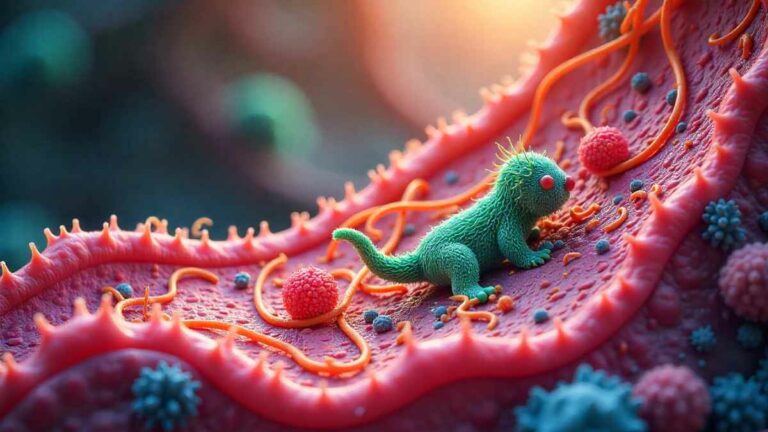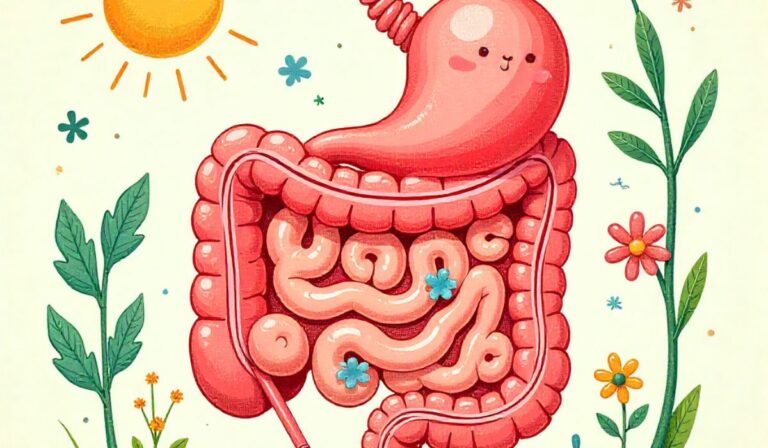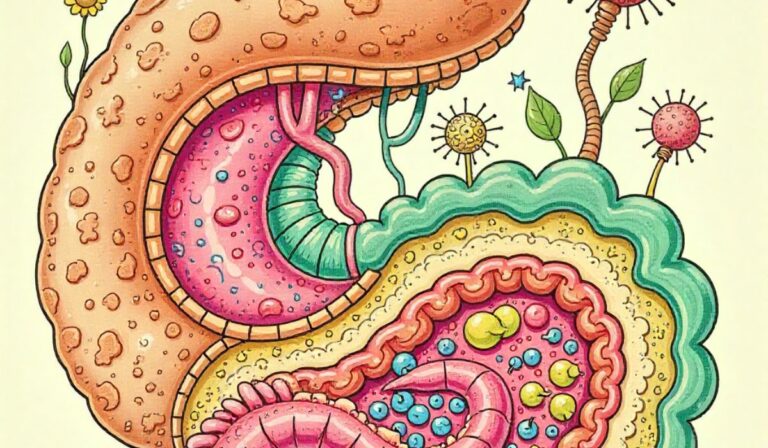How Smoking, Pollution & Toxins Damage Gut Flora and Your Health
Imagine waking up every day with a tummy ache, feeling sluggish, and battling constant cravings. This might be happening because of the unseen battle raging inside your gut!
Many people don’t realize how much smoking, exposure to pollution, and contact with toxins affect the tiny, but mighty, organisms living in their digestive system. This blog post will explore the effects these substances have on your gut flora.
By reading this, you’ll gain a better idea of how these factors impact your overall health and what you can do to protect your gut. You’ll learn about the science behind this and what steps you can take to improve your health and well-being.
Key Takeaways
![How Smoking, Pollution & Toxins Damage Gut Flora and Your Health[1]](https://mycleanseplan.com/wp-content/uploads/2025/10/How_Smoking_Pollution__Toxins_Damage_Gut_Flora_and_Your_Health1-2.jpg)
The Unseen Impact of Smoking on Your Gut
Smoking isn’t just bad for your lungs; it also takes a toll on your gut flora. The chemicals in cigarette smoke, when ingested or absorbed, negatively impact the delicate balance of bacteria in your digestive system.
This disruption can lead to a range of health problems, from digestive issues to a weakened immune system. Exploring these effects helps people to make knowledgeable choices that boost their health. In fact, the connection between gut health and overall health is increasingly understood by people.
How Smoking Alters Your Gut Microbiome
When someone smokes, they inhale thousands of chemicals, many of which are toxic. These substances don’t just stay in the lungs; they also enter the bloodstream and reach the gut.
Here, they wreak havoc on the gut flora, the community of microorganisms that live in the digestive tract. These chemicals can harm or kill beneficial bacteria, disrupting the balance between good and bad bacteria.
This imbalance is a major issue, which can lead to different health problems. Learning about this helps people to recognize risks.
- Decreased Bacterial Diversity: Smoking reduces the variety of bacteria in the gut. A healthy gut has a diverse microbiome, which is essential for proper digestion and immune function.
- Increased Harmful Bacteria: Smoking can promote the growth of harmful bacteria, like certain strains of E. coli. These bacteria can cause inflammation and other digestive issues.
- Reduced Beneficial Bacteria: Cigarette smoke can kill or decrease the number of helpful bacteria, such as Bifidobacteria and Lactobacilli, which are vital for maintaining a healthy gut.
- Impact on Gut Barrier: Chemicals from smoking can damage the gut lining, making it more permeable. This “leaky gut” allows toxins and bacteria to enter the bloodstream, causing inflammation.
Think of your gut as a carefully balanced ecosystem. Smoking acts like a harsh environmental change, upsetting the balance and harming the inhabitants. Protecting the ecosystem, in this case your gut, can help improve your health.
Smoking and Digestive Problems
The alterations smoking causes in your gut flora often translate into digestive troubles. These problems can range from mild discomfort to more serious conditions.
Recognising these potential issues can prompt someone to make good choices. Furthermore, the impact of smoking on the digestive system is a common concern. Knowing the science helps prevent serious health problems.
- Increased Risk of Inflammatory Bowel Disease (IBD): Smoking significantly increases the risk of developing IBD, which includes Crohn’s disease and ulcerative colitis. The changes in gut flora and increased inflammation contribute to these conditions.
- Irritable Bowel Syndrome (IBS) Symptoms: Smokers are more prone to IBS symptoms, like abdominal pain, bloating, constipation, and diarrhea. Altered gut bacteria can trigger and worsen these symptoms.
- Acid Reflux and Heartburn: Smoking weakens the lower esophageal sphincter (LES), causing stomach acid to flow back into the esophagus. This can lead to heartburn and acid reflux.
- Changes in Gut Motility: Smoking can affect how quickly food moves through the digestive tract, potentially causing constipation or diarrhea.
For example, imagine two individuals. One smokes, while the other does not. The smoker is experiencing frequent stomach aches and bloating. The nonsmoker is enjoying proper digestive processes. This shows how detrimental smoking can be to the body. Making changes, like quitting smoking, helps improve digestive health.
The Effects of Pollution on Gut Health
Like smoking, exposure to pollution can harm your gut flora. Air and water pollution introduce a range of toxins into the body, which can disrupt the delicate balance of the gut microbiome.
From the air we breathe to the water we drink, pollution poses a major threat to our health. Recognising the health threats can help people take action. Learning this will help people make intelligent choices for well-being.
Different Types of Pollution and Their Effects
Pollution comes in various forms, each posing a specific threat to gut health. These pollutants enter our bodies through different routes, from the air we breathe to the food we consume.
Some examples include air pollution, water pollution, and exposure to harmful chemicals. Comprehending different exposures helps people take active measures. Moreover, the risks and solutions can benefit people.
- Air Pollution: Air pollutants, like particulate matter, ozone, and nitrogen oxides, are inhaled and can enter the bloodstream. They also have an impact on the digestive system, including the gut.
- Water Pollution: Contaminated water can contain heavy metals, pesticides, and other toxins. These substances can directly harm the gut flora and trigger digestive problems.
- Industrial Chemicals: Exposure to industrial chemicals, such as those in cleaning products or pesticides, can damage the gut lining and disrupt the microbiome.
- Food Contamination: Processed foods, often containing artificial additives, preservatives, and pesticides, are often contaminated. These substances harm the gut bacteria.
Insert a visual comparison chart here: The chart should list the types of pollution and what harm they can cause to gut flora.
The Gut Microbiome and Pollution
When we’re exposed to pollution, the gut microbiome takes a hit. Toxins can directly harm beneficial bacteria. This upsets the balance and prompts the growth of harmful bacteria. These changes can lead to a variety of health issues.
The link between exposure and gut health is becoming clearer. People are starting to recognize these risks and how they impact their lives.
- Inflammation: Pollutants trigger inflammation in the gut. This can damage the gut lining and make it more permeable.
- Reduced Diversity: Pollution can decrease the variety of bacteria in the gut, making it less resilient to illness.
- Changes in Gut Motility: Pollution can disrupt how quickly food moves through the gut, contributing to constipation or diarrhea.
- Immune System Impact: A damaged gut can weaken the immune system.
Consider a real-life example: In areas with high levels of air pollution, people often report more digestive issues. The increased inflammation and disrupted gut flora play a part in this. By recognizing the impact, people can make changes to avoid pollution.
Understanding How Toxins Damage the Gut
Our everyday lives expose us to various toxins, from the foods we eat to the environment around us. These toxins can have a serious impact on our gut health. When the gut encounters toxins, it can cause a series of damaging effects.
Learning about these threats is important for protecting your overall health and understanding how to live better. By knowing how toxins impact you, you can avoid these things.
Common Sources of Toxins
Toxins surround us, coming from many sources. From what we eat to the air we breathe, these toxins can disrupt our gut health. This is why taking action is vital for proper health. The following list can help people take action to avoid these toxins:
- Processed Foods: Processed foods often contain artificial additives, preservatives, and high levels of sugar and unhealthy fats. These can harm gut bacteria and trigger inflammation.
- Pesticides and Herbicides: Pesticides and herbicides on non-organic fruits and vegetables can enter our bodies, damaging the gut flora. Washing produce thoroughly can help, but it won’t remove everything.
- Heavy Metals: Heavy metals, like lead and mercury, are found in water and some foods. They can accumulate in the gut and disrupt the gut microbiome.
- Medications: Some medications, like antibiotics and nonsteroidal anti-inflammatory drugs (NSAIDs), can harm gut bacteria. Antibiotics can kill both good and bad bacteria. NSAIDs can damage the gut lining.
Did you know? According to a study published in the “American Journal of Clinical Nutrition”, the average person is exposed to hundreds of different chemicals daily, with some of these substances having a harmful impact on the gut flora.
How Toxins Disrupt the Gut Microbiome
When the gut is exposed to toxins, the gut microbiome faces a tough challenge. Toxins can directly attack beneficial bacteria, causing an imbalance. This imbalance can lead to a host of health problems. By taking action and avoiding these toxins, you can protect your health.
- Damage to the Gut Lining: Toxins can damage the gut lining. This damage can lead to leaky gut, which allows toxins and bacteria to enter the bloodstream.
- Reduced Nutrient Absorption: Toxins can impact the gut’s ability to absorb nutrients, causing deficiencies.
- Increased Inflammation: Toxins trigger an inflammatory response in the gut. This inflammation can damage the gut lining and worsen digestive problems.
- Altered Gut Motility: Toxins affect how quickly food moves through the digestive tract, leading to issues.
Here is a case study: Sarah, who worked in a manufacturing plant, was constantly exposed to chemicals. She often had digestive issues, like bloating and abdominal pain.
However, her symptoms improved when she changed jobs and reduced her exposure to these chemicals. This shows how toxins can impact health.
The Connection Between Gut Flora, Overall Health, and the Immune System
The gut flora isn’t just about digestion. It plays a key part in overall health. The bacteria in your gut have a profound impact on the immune system, mental health, and many other bodily functions. The link between gut flora and overall health is becoming clearer.
Understanding this is the key to taking better care of your health. Making these lifestyle changes can significantly improve your health.
The Immune System and Gut Health
A large portion of the immune system lives in the gut. The gut flora works closely with the immune system, forming a strong partnership.
When the gut flora is healthy, the immune system also functions effectively. The reverse is also true. A healthy gut flora helps the body to fight infection. Learning about this can boost your health and avoid illness.
- Immune Cell Training: The gut flora helps train the immune system. It teaches immune cells to recognize and respond to threats, like bacteria and viruses.
- Production of Antibodies: Beneficial bacteria in the gut help produce antibodies, which protect against infections.
- Gut Barrier Function: A healthy gut flora strengthens the gut lining, preventing pathogens from entering the bloodstream.
- Inflammation Control: The gut flora helps regulate inflammation. Chronic inflammation can weaken the immune system and lead to disease.
A recent study published in “Nature Medicine” found that an unhealthy gut can impair the immune system’s ability to fight off infections. The reverse is also true: A healthy gut can support the immune system.
Gut Flora and Mental Wellbeing
There’s a direct link between the gut and the brain. This is often called the gut-brain axis. The gut flora can affect mood, behavior, and cognitive function.
Changes in the gut flora can impact the brain. Taking care of gut health can have a positive impact on mental health. Understanding this can open up a whole new way to improve your well-being. Here are some ways you can improve your health.
- Mood Regulation: The gut produces neurotransmitters, like serotonin, which play a part in mood regulation. A healthy gut is important for mental health.
- Stress Response: The gut flora can affect the body’s stress response. An unhealthy gut can make you more susceptible to stress and anxiety.
- Cognitive Function: The gut flora has been linked to cognitive function, like memory and focus. A healthy gut may enhance these cognitive abilities.
- Reduced Risk of Mental Health Conditions: Research indicates that a healthy gut may reduce the risk of mental health problems, such as depression and anxiety.
Did you know? Studies have shown that people with irritable bowel syndrome (IBS) are more likely to experience symptoms of depression and anxiety. This further demonstrates the link between gut health and mental wellbeing.
How to Protect and Improve Your Gut Flora
While smoking, pollution, and toxins can damage your gut flora, there are many things you can do to protect and improve your gut health.
This includes making healthy lifestyle choices and avoiding harmful exposures. You can change your habits and increase the bacteria in your body. Knowing these methods is vital to your overall health.
Dietary Changes for Gut Health
Your diet plays a key role in the health of your gut flora. Eating the right foods can support a healthy gut. Here are some dietary strategies you can put into place to improve your gut flora and your health.
- Eat Plenty of Fiber: Fiber feeds the good bacteria in your gut. Focus on eating a variety of fruits, vegetables, and whole grains.
- Include Probiotic-Rich Foods: Probiotics are live microorganisms that benefit your gut. Yogurt, kefir, sauerkraut, and kimchi are great sources.
- Consume Prebiotic Foods: Prebiotics are foods that feed the good bacteria in your gut. Onions, garlic, bananas, and asparagus are good examples.
- Limit Processed Foods: Processed foods are often high in sugar and unhealthy fats. They can negatively impact your gut health.
Here’s a helpful tip: Introduce new foods slowly. This will help you see how each food affects your health and avoid any digestive issues.
Other Lifestyle Modifications
Beyond your diet, other lifestyle choices can support gut health. These choices can help to improve your overall health. Knowing these things can enhance your lifestyle. These changes are great for well-being.
- Avoid Smoking: Quitting smoking can significantly improve your gut health. It removes the harmful effects of cigarette smoke.
- Reduce Exposure to Pollution and Toxins: Limit your exposure to polluted air and water.
- Manage Stress: Chronic stress can harm your gut health. Practice stress-reducing techniques, like yoga or meditation.
- Get Enough Sleep: Lack of sleep can negatively impact your gut health. Aim for 7-9 hours of quality sleep each night.
Here’s a real-life example: John made some changes to his life after experiencing health issues. He quit smoking, changed his diet, and reduced his stress levels. After a few weeks, his digestive issues improved. This change helped him boost his health. By taking these steps, he improved his life.
FAQ Of How Smoking, Pollution & Toxins Damage Gut Flora and Your Health
What is gut flora?
A: Gut flora is the community of microorganisms that live in your digestive tract, mainly bacteria, which is essential for digestion and immune function.
How does smoking affect the gut flora?
A: Smoking introduces harmful chemicals that damage the gut flora, reducing diversity, promoting bad bacteria, and harming the gut lining.
Can pollution harm the gut?
A: Yes, exposure to pollution can introduce toxins. These toxins can disrupt the balance of the gut microbiome, leading to inflammation and digestive problems.
How can I improve my gut health?
A: You can improve your gut health by eating a fiber-rich diet, including probiotics and prebiotics, avoiding processed foods, quitting smoking, and reducing exposure to pollution.
Why is gut health important?
A: Gut health affects digestion, immune function, mental wellbeing, and overall health. A healthy gut supports the immune system and contributes to mental health.
Final Thoughts
The effects of smoking, pollution, and toxins on your gut flora are significant and impact your overall well-being.
These substances can disrupt the delicate balance of your gut bacteria, contributing to digestive issues, immune problems, and even mental health concerns.
However, there are things you can do to protect and improve your gut health. By adopting a gut-friendly diet, avoiding smoking, and limiting your exposure to pollution, you can nurture your gut flora.
Making these choices today is an investment in your long-term health. So, start small, make gradual changes, and prioritize your gut health. It’s a crucial step toward a healthier, happier you!


![Behind the Scenes Exploring How Microbiome Research Functions[1]](https://mycleanseplan.com/wp-content/uploads/2025/11/Behind_the_Scenes__Exploring_How_Microbiome_Research_Functions1-768x448.jpg)



![Data Privacy & Ethics in Gut Microbiome Testing Explored[1]](https://mycleanseplan.com/wp-content/uploads/2025/10/Data_Privacy__Ethics_in_Gut_Microbiome_Testing_Explored1-768x448.jpg)